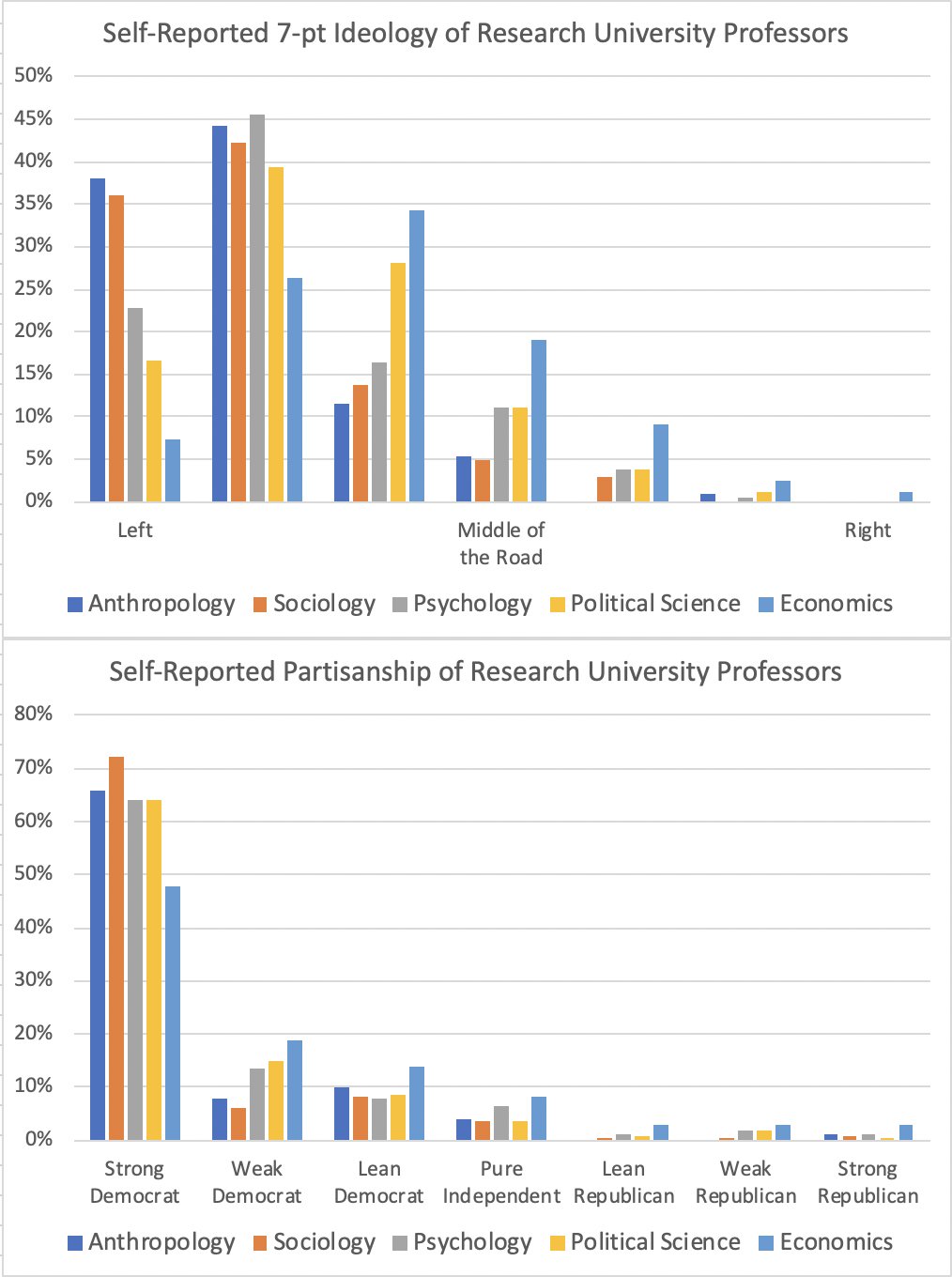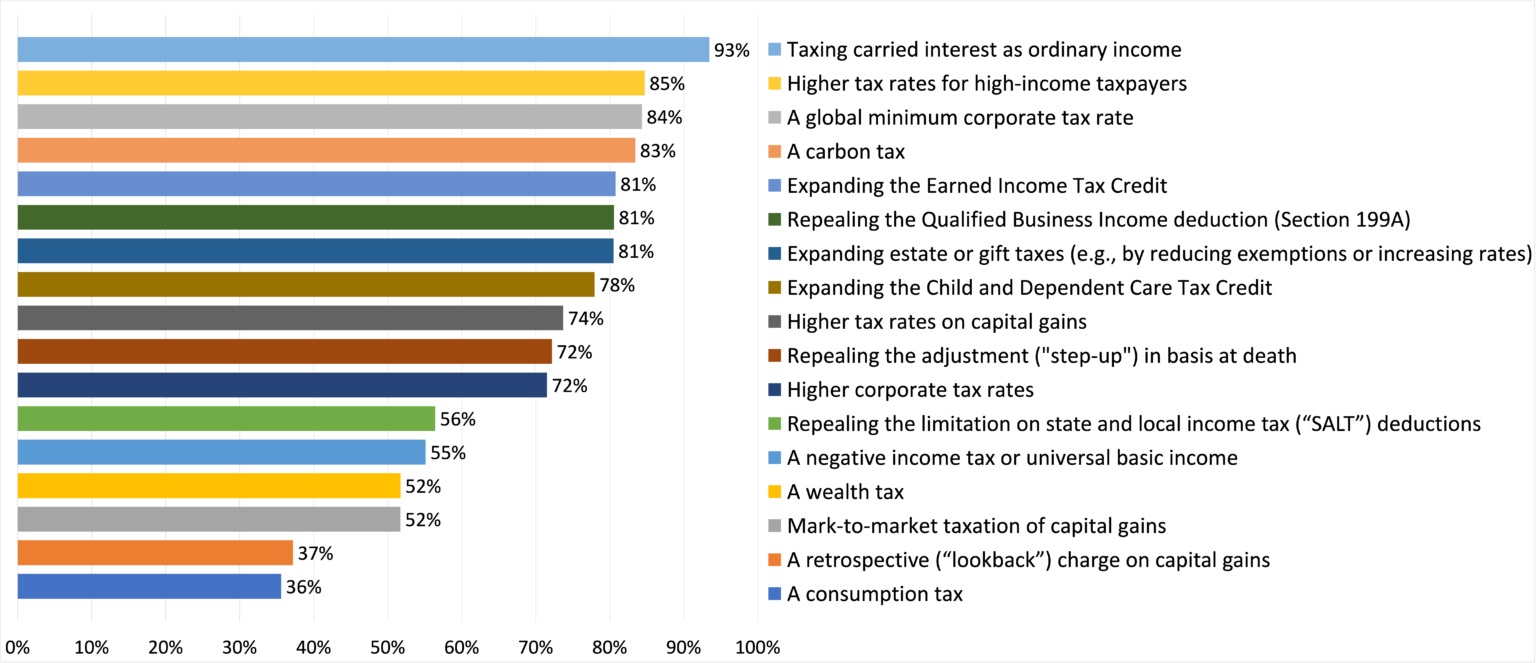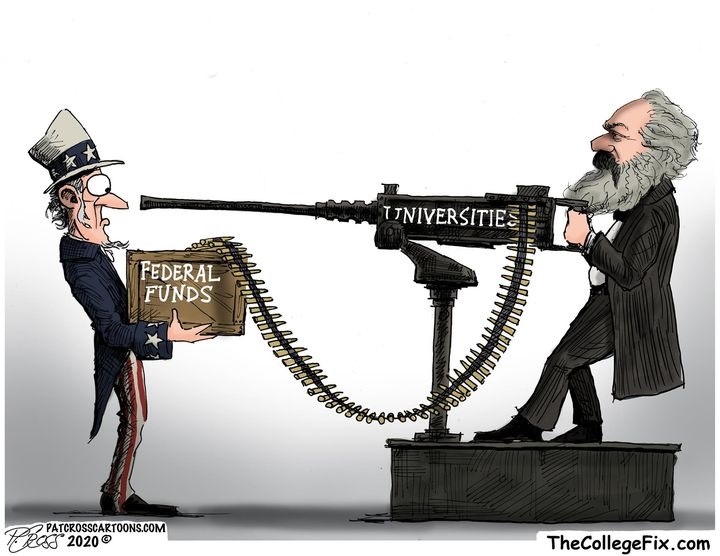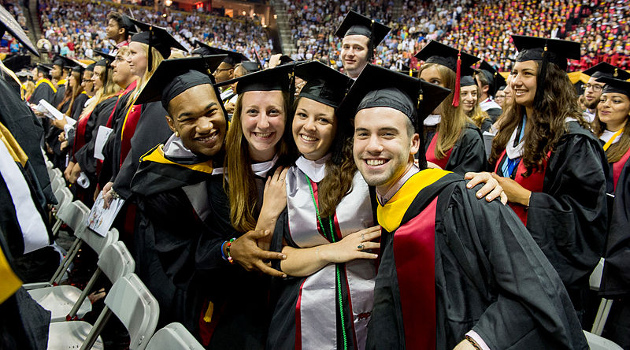I’ve only addressed academic bias one time and that was back in 2018. So let’s thoroughly examine that topic today, starting with this video from Prager University.
Let’s now augment the video with some additional data.
First, let’s confirm that academics lean far to the left. Here’s how professors rate their own ideology.

Even economists lean overwhelmingly to the left, though not quite so bad as the other fields of study.
Meanwhile, professors of tax law overwhelmingly support class warfare, including really punitive policies such as higher death taxes, global minimum taxes for business, and more punitive taxation of capital gains.

By the way, I’m guessing that tax law professors oppose a consumption tax (like the value-added tax) for the wrong reason. They’re not against more revenue for politicians, just against higher taxes that don’t specifically target upper-income taxpayers.
Academic bias is a problem at Ivy League schools. As illustrated by this headline from a report about Harvard.

And this headline from a story about Yale.

But the problem is not confined to the supposedly elite colleges.
This story shows an overwhelming tilt to the left in the middle of the country.

Heck, it’s a nationwide phenomenon, as illustrated by the headline of this story.

I could share dozens of similar headlines (including data from the Legatum Institute showing similar bias in other nations), but let’s now focus on why this bias exists and whether it’s a problem.
In a column for the Foundation for Economic Education, Brian Balfour asks why academics are so sympathetic to statism.
…an overwhelming majority of university professors in America are on the political Left. A common response from leftists circulating to this reality is that “academics are liberal because that is the way intelligent people think.” …Intellectuals, according to Hayek, are drawn to utopian visions. First and foremost among those visions is the creation of a new social order, specifically one designed by “experts.” …In short, progressive intellectuals fancy themselves as radicals, desiring to overturn capitalism and traditional Western culture, with themselves at the helm. …For the ambitious among them, an academic career provides a rosy opportunity. …There is an inherent liberal bias favoring greater social control by the state among academics in part because it’s the only avenue academics have to become the social reformists they desire to be. …Finally, there is the role played by naked self-interest. Government subsidies and student financial aid make up a significant share of revenue for universities. Furthermore, government grants dominate funding for academic research. Academics reap financial benefits from government largesse. What a tidy coincidence that most academics favor big government.
There’s also an issue of self-selection bias.
In other words, smart kids on the right focus on business-oriented careers while smart kids on the left focus on academic-oriented careers.
Some of the research on this topic is discussed in this article for Inside Higher Ed by Scott Jaschik.
…professors’ political lopsidedness reflects self-selection… Gross and Fosse, and Catherine Cheng, a graduate student at the time, contributed to a 2010 book, Diversity in American Higher Education: Toward a More Comprehensive Approach (Routledge), that built on the theory of self-selection. Their research suggested that academics tend to form their views on politics early in life… Yet more evidence for the self-selection theory comes from a 2007 study, “Left Pipeline: Why Conservatives Don’t Get Doctorates,” by the husband-and-wife social science team of Matthew Woessner of Pennsylvania State University at Harrisburg and April Kelly-Woessner of Elizabethtown College. …They found that in both choices of majors and in personal values, conservatives seem to be taking themselves off the track for academic careers well before graduate school. The authors did not find evidence of statistically significant differences in grades or measures of academic performance… For starters, the paper finds that conservatives are much more likely to pick majors in professional fields — areas that tend to put students on the fast track for an M.B.A. (or for a job) more than a Ph.D. Only 9 percent of students on the far left and 18 percent of liberals major in professional fields, compared to 33 percent of conservatives and 37 percent of those who identify as being on the far right.
Now that we’ve established that there is academic bias, and also speculated on the factors that lead leftists to dominate higher education, let’s ask whether this is a problem.
I’m tempted to say yes because I don’t want students getting nothing but a Keynesian perspective when learning about economics.
But a biased education is just one potential problem. There’s also a quasi-totalitarian suppression of alternative views.
This left-wing groupthink in academia is not good for professors. I recommend this column in the Atlantic by Professor John McWhorter, but the headline may suffice if you’re pressed for time.

And this headline from another story in the Atlantic, this one by Conor Friedersdorf, shows that there’s a chilling effect on open discourse by students.

The problem even exists in secondary education, as captured by this headline from an article by Samuel Abrams in National Review.

I’m also worried about a decline in academic rigor.
We’ve all presumably heard horror storied about grade inflation.
But I think this data, shared in Psychology Today by Glenn Geher, is even more worrisome.
We designed a study with academics in mind. In short, we surveyed nearly 200 academics from around the US and asked them to rate the degree to which they prioritize each of the five following academic values:
- Academic rigor
- Knowledge advancement
- Academic freedom
- Students’ emotional well-being
- Social Justice
Some highlights of the findings are as follows:
- Relatively conservative professors valued academic rigor and knowledge advancement more than did relatively liberal professors.
- Relatively liberal professors valued social justice and student emotional well-being more so than did relatively conservative professors…
- Business professors placed relative emphasis on knowledge advancement and academic rigor while Education professors placed relative emphasis on social justice and student emotional well-being…
Our Discussion focuses largely on how these data are consistent with a highly politicized portrait of academia.
The bottom line is that professors are overwhelmingly on the left and such professors openly admit they are guided by social justice and emotions rather than rigor and knowledge.
That doesn’t bode well for America’s future.
So what is the solution?
There isn’t one, at least nothing that directly would solve the problem. I don’t want politicians telling professors what to teach. And I don’t want politicians imposing ideological quotas.
But there is an indirect step that might help. Get rid of taxpayer subsidies.
I’ve previously pointed out that grants and loans are bad policy because they lead to higher tuition and fees, as well as bureaucratic bloat.
But there’s also an ethical issue. As shown in this cartoon, taxpayers should not be coerced into financing bad ideas. Heck, they shouldn’t be coerced into financing good ideas, either.

I also think there are problems with the accreditation process, as well as the bias for college training over vocational training (see this excellent set of tweets by Oren Cass).
P.S. For a particularly horrifying example of leftist groupthink in action, watch these three videos.
P.P.S. Media bias is also an important issue (see here, here, here, here, and here).
———
Image credit: Maryland GovPics | CC BY 2.0.



